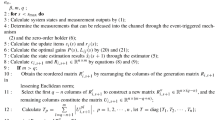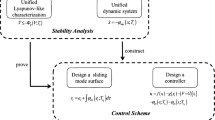Abstract
This paper investigates the finite-time stabilization for a class of nonlinear systems by proposing a new event-triggered controller. The novelty lies in that, by introducing an exponential term, the control gains are exponential alterable in the interval of two adjacent event instants. Moreover, based on the proposed controller, a specific event-triggered scheme with a new type of error function is also derived to stabilize the concerned system in a finite time. In addition, a positive lower bound of the inter-execution is obtained, such that the Zeno behaviors can be avoided. Finally, illustrative examples are provided to verify that the overall amount of triggered events can be reduced by utilizing the proposed method in this paper.










Similar content being viewed by others
References
Ding, S., Wang, Z., Rong, N., Zhang, H.: Exponential stabilization of memristive neural networks via saturating sampled-data control. IEEE Trans. Cybern. 47(10), 3027–3039 (2017)
Wang, Z., Xie, Y., Lu, J., Li, Y.: Stability and bifurcation of a delayed generalized fractional-order prey-predator model with interspecific competition. Appl. Math. Comput. 347, 360–369 (2019)
Yang, D., Zong, G., Karimi, H.R.: \(H_\infty \) refined anti-disturbance control of switched LPV systems with application to aero-engine. IEEE Trans. Ind. Electron. https://doi.org/10.1109/TIE.2019.2912780
Rong, N., Wang, Z., Zhang, H.: Finite-time stabilization for discontinuous interconnected delayed systems via interval type-2 TS fuzzy model approach. IEEE Trans. Fuzzy Syst. 27(2), 249–261 (2019)
Zong, G., Wang, R., Zheng, W., Hou, L.: Finite-time \(H_\infty \) control for discrete-time switched nonlinear systems with time delay. Int. J. Robust Nonlinear Control 25(6), 914–936 (2015)
Wang, Z., Rong, N., Zhang, H.: Finite-time decentralized control of IT2 TS fuzzy interconnected systems with discontinuous interconnections. IEEE Trans. Cybern. https://doi.org/10.1109/TCYB.2018.2848626
Cai, Z., Huang, L.: Finite-time stabilization of delayed memristive neural networks: discontinuous state-feedback and adaptive control approach. IEEE Trans. Neural Netw. Learn. Syst. 29(4), 856–868 (2018)
Xu, Y., Lu, R., Shi, P., Li, H., Xie, S.: Finite-time distributed state estimation over sensor networks with round-robin protocol and fading channels. IEEE Trans. Cybern. 48(1), 336–345 (2018)
Bhat, S.P., Bernstein, D.S.: Finite-time stability of continuous autonomous systems. SIAM J. Control Optim. 38(3), 751–766 (2000)
Bhat, S.P., Bernstein, D.S.: Finite-time stability of homogeneous systems. In: American control conference, proceedings of the 1997, vol. 4, pp. 2513–2514. IEEE (1997)
Forti, M., Nistri, P., Papini, D.: Global exponential stability and global convergence in finite time of delayed neural networks with infinite gain. IEEE Trans. Neural Netw. Learn. Syst. 16(6), 1449–1463 (2005)
Nersesov, S.G., Haddad, W.M.: Finite-time stabilization of nonlinear impulsive dynamical systems. Nonlinear Anal. Hybrid Syst. 2(3), 832–845 (2008)
Yang, R., Zang, F., Sun, L., Zhou, P., Zhang, B.: Finite-time adaptive robust control of nonlinear time-delay uncertain systems with disturbance. Int. J. Robust Nonlinear Control. https://doi.org/10.1002/rnc.4415
Zong, G., Ren, H., Hou, L.: Finite-time stability of interconnected impulsive switched systems. IET Control Theory Appl. 10(6), 648–654 (2016)
Ren, H., Zong, G., Karimi, H.R.: Asynchronous finite-time filtering of networked switched systems and its application: an event-driven method. IEEE Trans. Circuits Syst. I: Regul. Pap. 66(1), 391–402 (2019)
Ren, H., Zong, G., Li, T.: Event-triggered finite-time control for networked switched linear systems with asynchronous switching. IEEE Trans. Syst. Man Cybern. Syst. 48(11), 1874–1884 (2018)
Zhu, Y., Guan, X., Luo, X., Li, S.: Finite-time consensus of multi-agent system via nonlinear event-triggered control strategy. IET Control Theory Appl. 9(17), 2548–2552 (2015)
Wang, L., Wang, Z., Wei, G., Alsaadi, F.E.: Finite-time state estimation for recurrent delayed neural networks with component-based event-triggering protocol. IEEE Trans. Neural Netw. Learn. Syst. 29(4), 1046–1057 (2018)
Selivanov, A., Fridman, E.: Event-triggered \( H_ {\infty } \) control: a switching approach. IEEE Trans. Autom. Control 61(10), 3221–3226 (2016)
Guo, Z., Gong, S., Wen, S., Huang, T.: Event-based synchronization control for memristive neural networks with time-varying delay. IEEE Trans. Cybern. https://doi.org/10.1109/TCYB.2018.2839686
Yue, D., Tian, E., Han, Q.L.: A delay system method for designing event-triggered controllers of networked control systems. IEEE Trans. Autom. Control 58(2), 475–481 (2013)
Ahmed-Ali, T., Fridman, E., Giri, F., Burlion, L., Lamnabhi-Lagarrigue, F.: Using exponential time-varying gains for sampled-data stabilization and estimation. Automatica 67, 244–251 (2016)
Ding, S., Wang, Z., Zhang, H.: Event-triggered stabilization of neural networks with time-varying switching gains and input saturation. IEEE Trans. Neural Netw. Learn. Syst. 29(10), 5045–5056 (2018)
Xu, W., Ho, D.W., Li, L., Cao, J.: Event-triggered schemes on leader-following consensus of general linear multiagent systems under different topologies. IEEE Trans. Cybern. 47(1), 212–223 (2017)
Tian, E., Yue, D.: Decentralized control of network-based interconnected systems: a state-dependent triggering method. Int. J. Robust Nonlinear Control 25(8), 1126–1144 (2015)
Gu, Z., Shi, P., Yue, D.: An adaptive event-triggering scheme for networked interconnected control system with stochastic uncertainty. Int. J. Robust Nonlinear Control 27(2), 236–251 (2017)
Zhang, H., Cheng, J., Wang, H., Chen, Y., Xiang, H.: Robust finite-time event-triggered \( H_ {\infty } \) boundedness for network-based Markovian jump nonlinear systems. ISA Trans. 63, 32–38 (2016)
Zhang, H., Yue, D., Yin, X., Hu, S., xia Dou, C.: Finite-time distributed event-triggered consensus control for multi-agent systems. Inf. Sci. 339, 132–142 (2016)
Ma, G., Liu, X., Qin, L., Wu, G.: Finite-time event-triggered \( H_ {\infty } \) control for switched systems with time-varying delay. Neurocomputing 207, 828–842 (2016)
Ahmed-Ali, T., Fridman, E., Giri, F., Burlion, L., et al.: Using exponential time-varying gains for sampled-data stabilization and estimation. Automatica 67, 244–251 (2016)
Ning, B., Jin, J., Zheng, J., Man, Z.: Finite-time and fixed-time leader-following consensus for multi-agent systems with discontinuous inherent dynamics. Int. J. Control 91(6), 1259–1270 (2018)
Ames, A.D., Sastry, S.: Characterization of Zeno behavior in hybrid systems using homological methods. In: American control conference, 2005. Proceedings of the 2005, vol. 2, pp. 1160–1165. IEEE (2005)
Matsumoto, T., Chua, L., Komuro, M.: The double scroll. IEEE Trans. Circuits Syst. 32(8), 797–818 (1985)
Zou, L., Wang, Z.D., Zhou, D.H.: Event-based control and filtering of networked systems: a survey. Int. J. Autom. Comput. 14(3), 239–253 (2017)
Author information
Authors and Affiliations
Corresponding author
Ethics declarations
Conflict of interest
The authors declare that they have no conflict of interest.
Additional information
Publisher's Note
Springer Nature remains neutral with regard to jurisdictional claims in published maps and institutional affiliations.
This work was supported in part by the National Natural Science Foundation of China under Grants 61433004 and 61627809, LiaoNing Revitalization Talents Program under Grant XLYC1802010, and in part by SAPI Fundamental Research Funds under Grant 2018ZCX22.
Rights and permissions
About this article
Cite this article
Rong, N., Wang, Z. Finite-time stabilization of nonlinear systems using an event-triggered controller with exponential gains. Nonlinear Dyn 98, 15–26 (2019). https://doi.org/10.1007/s11071-019-05167-3
Received:
Accepted:
Published:
Issue Date:
DOI: https://doi.org/10.1007/s11071-019-05167-3




